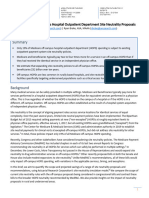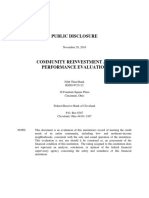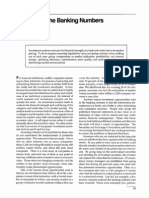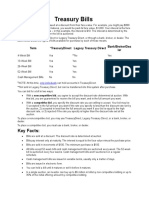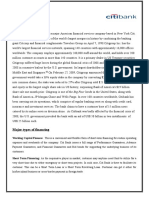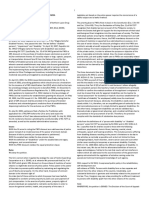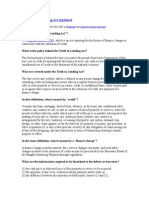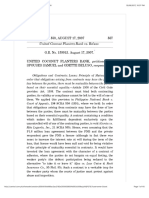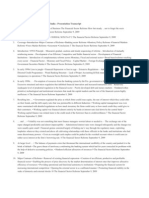Citibank
Citibank
Uploaded by
meenakshi56Copyright:
Available Formats
Citibank
Citibank
Uploaded by
meenakshi56Original Description:
Original Title
Copyright
Available Formats
Share this document
Did you find this document useful?
Is this content inappropriate?
Copyright:
Available Formats
Citibank
Citibank
Uploaded by
meenakshi56Copyright:
Available Formats
Citibank, N.A.
On June 16, 1812, with $2 million of capital, City Bank of New York (now Citibank) opened for business in New York City. Through many different leaders and economic environments over the course of its rich history, Citibank continues to grow and prosper. In 1968, First National City Corporation (later renamed Citicorp), a bank holding company, became the parent of Citibank. In 1998, all Citicorp divisions merged with all divisions of Travelers Group to form Citigroup Inc. Citibank continues as a strong brand under the Citigroup umbrella.
1 812 1856 1 865 1897 1 902 1914 1 915 1928 1 929 1939 1 940 1955 1 959 1965 1 966 1970 1 974 1981 1 982 1989 1
1812
June 16: New York State charters City Bank of New York with authorized capital of $2 million and paidin capital of $800,000. September 14: City Bank opens for business to serve a group of New York merchants. Samuel Osgood is elected president (18121813).
1813
First dividend is paid.
1822
Farmers' Fire Insurance and Loan Company is founded, the first incorporated trust company in the U.S. Its name becomes Farmers' Loan and Trust Company in 1835, and it merges with National City Bank in 1929.
1827
Isaac Wright is elected president (18271832).
1856
Moses Taylor is elected president (18561882).
992 1998
citigroup.com
Connect With Us:
Terms of Use Privacy Careers Contact Us Site Map Our Blog
Citigroup.com is the global source of information about and access point to financial services provided by the Citi family of companies.
India
Committed to India for over 106 years, Citi prides itself in being a premier locally-embedded financial institution backed by its global network across 100 countries. With over 10,000 employees and US$3.1 billion capital invested, Citi is the single largest foreign direct investor in the financial services industry in India. Citi is a dominant provider of banking and financial services in India and offers a comprehensive suite of products and services to over 1,500 large corporates and multinationals, over 2,500 small and medium enterprises and over 7 million retail customers. Citi India's operations encompass corporate and investment banking, consumer banking, private banking, and banking services to the international Indian community. The breadth of Citi's activities in India include: Institutional Clients Group A leading corporate bank with a 106-year history of serving Indian corporate sector and financial institutions Enjoys a dominant market share in key products like cash management, FX and Custodial Services
Has a fast growing SME franchise with a dominant share of market in many key verticals
Investment Banking & Capital Markets - Citi Dominant Investment Bank across both fund raising and advisory services Leading advisor on Equity and Equity-linked transactions Top-notch local currency debt house Pioneers in Securitisation Leading issuer of G3 bonds A top-notch Research team providing top quality research & international expertise to trading oriented investors through comprehensive coverage of the Indian markets across sectors Leading equity trading house
Alternate Investments - Citi Venture Capital International A leading private equity player over the last decade Investments in multiple sectors in the country in sectors including auto components, financial services, ITES and real estate.
Consumer Banking & Global Cards Citibank Pioneered consumer banking and was the first to introduce credit cards and consumer finance. Significant investments in technology have enabled Citi to maintain its edge through alternative distribution channels ATM, online banking, phone banking, mobile banking Retail network includes 40 branches in 28 cities and over 450 ATMs
CitiFinancial Citi Wealth Advisors
Consumer finance services for Personal Loans, Home Loans, and third-party insurance Over 350 branches across 180 geographic locations
Financial planning and investment advisory based on a retail brokerage platform to serve wealth management needs of retail investors
Global Wealth Management Citi Private Bank A holistic approach to wealth management for both individuals and businesses throughout the wealth creation cycle Provides the full range of finance, banking, investment, trust and advisory services for wealth creators Trusted advisors for designing insightful solutions customized to individual client needs, with an emphasis on personalized, confidential service
Outsourcing India is a key outsourcing hub for Citi: Provides software development for over 50 countries Offers knowledge outsourcing services to Citi's Investment Bank and Research teams across the globe
Citibank Swot Analysis
Situation Analysis Citibank is looking to expand their reach within the banking world. They had an opportunity to acquire Confia a Mexican bank. Many Mexican banks are having problems due to the lack of money and resources the Mexican people have to invest in the banks. Citibank does much research while deciding whether to follow through with the deal. At the very end of the purchasing process an undiscovered threat is exposed to Citibank that Confia may have. This brings more difficulties within the purchasing process.
Firm Strengths
Citibank's many strengths start within their 194 year old rich history. Citibank has more than 100 years of experience in the international lending field. They are also the worlds largest credit lender and have been since the 1970's. They have also taken the title of the world's largest bank in 1981. In 1994 Citibank decided to break their company up into two sectors. One division being the Global Consumer Division and the other the Global Finance Division. This is strength for Citibank because this allows for more focus on their separate segments of the market. Citibank also holds advantages and strengths within the Mexican banking market. After the Tequila Crisis most U.S. banks took their business out of Mexico, Citibank did not. They also found strength in the fact that their portfolio was not as large as other banks in Mexico, this allowing them to have fewer complications. Confia also had some strengths. Begging with their 300 branches they had in 1992. Confia also has a great reputation. They are known for their great customer service, quality and efficiency. Confia is also a Mexican bank. This provides them with local and governmental support, that foreign banks may not get. If Citibank acquired Confia some strengths that may come about are possible high returns. Again the accusation will allow Citibank to have a better local image. This may also lead to other...
itibank, N.A. - Strategic SWOT Analysis Review Summary Citibank N.A. (Citibank) is a consumer bank and wholly owned subsidiary of Citigroup, Inc. The bank offers a range of banking products and services such as commercial banking, retail banking, consumer finance, mortgage lending, investment banking, cash management, e-commerce, trade finance, and private banking. It provides deposit accounts, credit cards and loans to consumers and small businesses, and utilizes its parent's breadth of financial services by also offering insurance and investment products. It manages 200 million customer accounts across six continents in more than 100 countries. The bank principally operates in Europe, Americas, Middle East, Asia and Africa including the US, China, Hong Kong, India, Japan, the Philippines and Singapore. Citibank is headquartered in Las Vegas, Nevada, US. Citibank, N.A. Key Recent Developments Dec 21, 2010: TAQA Secures $3 Billion Revolving Credit Facility Sep 23, 2010: Maersk Secures $6.75 Billion Revolving Credit Facility Jun 25, 2010: SATORP Completes $8.5 Billion Project Financing For Jubail Refinery In Saudi Arabia Apr 12, 2010: Citibank Introduces Same-day Card Issuance Service In Hong Kong Mar 24, 2010: Gas Natural Signs EUR4 Billion Syndicated Loan Facility With 18 Banks GlobalDatas Citibank, N.A. - Strategic SWOT Analysis Review provides a comprehensive insight into the companys history, corporate strategy, business structure and operations. The report contains a detailed SWOT analysis, information on the companys key employees, key competitors and major products and services. This up-to-the-minute company report will help you to formulate strategies to drive your business by enabling you to understand your partners, customers and competitors better.
Scope - Business description A detailed description of the companys operations and business divisions. - Corporate strategy GlobalDatas summarization of the companys business strategy. - SWOT analysis A detailed analysis of the companys strengths, weakness, opportunities and threats. - Company history Progression of key events associated with the company. - Major products and services A list of major products, services and brands of the company. - Key competitors A list of key competitors to the company. - Key employees A list of the key executives of the company. - Executive biographies A brief summary of the executives employment history. - Key operational heads A list of personnel heading key departments/functions. - Important locations and subsidiaries A list of key locations and subsidiaries of the company, including contact details. Note: Some sections may be missing if data is unavailable for the company. Reasons to Buy - Gain key insights into the company for academic or business research purposes. Key elements such as SWOT analysis and corporate strategy are incorporated in the profile to assist your academic or business research needs. - Identify potential customers and suppliers with this reports analysis of the companys business structure, operations, major products and services and business strategy. - Understand and respond to your competitors business structure and strategies with GlobalDatas detailed SWOT analysis. In this, the companys core strengths, weaknesses, opportunities and threats are analyzed, providing you with an up to date objective view of the company. - Examine potential investment and acquisition targets with this reports detailed insight into the companys strategic, business and operational performance.
Reasons to buy
Gain key insights into the company for academic or business research purposes. Key elements such as SWOT analysis, corporate strategy and financial ratios and charts are incorporated in the profile to assist your academic or business research needs. Identify potential customers and suppliers with this reports analysis of the companys business structure, operations, major products and services and business strategy. Understand and respond to your competitors business structure and strategies with GlobalDatas detailed SWOT analysis. In this, the companys core strengths, weaknesses, opportunities and threats are analyzed, providing you with an up to date objectiveview of the company. Examine potential investment and acquisition targets with this reports detailed insight into the companys strategic, financial and operational performance. Financial ratios presented for major public companies in the report include revenue trends, profitability, growth, margins and returns, liquidity and leverage, financial position and efficiency ratios.
HSBC Group
Strengths
events.
The bank is well capitalised and this has enabled it to perform relatively well against other banks in recent economic
The level of capitalisation means that, going forward, the bank is unlikely to need to borrow from the UK government: this will enable it to retain more autonomy.
The bank has a strong presence in emerging markets, putting it in a good position to take advantage of future growth in those economies. The banks global presence in Europe, Asia and South America helps to spread risk and offers significant economies of scale.
Despite rebranding relatively recently (1999), the HSBC brand has become well-established and is considered particularly valuable within the industry.
Weaknesses
HSBC associates itself strongly with investment in the small business sector, but the current economic situation has led to increased risks, potentially compromising the activity levels in this area of the operation. The bank was involved with sub-prime markets in the US and has had to write off large figures lent to high-risk borrowers.
Despite falls in the UK interest rate, HSBC has increased its mortgage rates. This may be perceived negatively by borrowers and potential borrowers, adds pressure to an already depressed housing market and could ultimately lead to more defaulting as borrowers struggle with higher repayments.
loyalty.
A redundancy programme announced recently may affect morale among staff, leading to decreased production and
HSBCs branding emphasises its global presence, and this may be seen negatively by some customers in its implication of homogenisation and lack of personalisation.
Opportunities
HSBCs high level of capitalisation places it in a strong position to acquire assets Banks finding trading conditions particularly difficult at present may be available at low cost HSBC also has adequate capital to purchase stronger banks such as Bank Ekonomi in Indonesia, in which it has purchased a stake to continue its Asian expansion despite challenging economic times.
Threats
HSBCs generally strong position presents the opportunity to outperform competitors during the economic downturn and to build a reputation for being one of the safer banks for depositors, helping to increase resources for lending. Negative press coverage of competitors such as HBOS may encourage customers to choose HSBC instead.
Trust in banks has decreased due to financial losses suffered by investors, who may be more inclined to invest elsewhere. Financial losses affecting banks and investors on a global scale have resulted in less credit being available to customers. In the UK this is coupled with increases in living costs resulting in less money being saved.
default.
The falling property market has created a rise in numbers of homeowners with negative equity. If a property is worth less than was borrowed to finance its purchase, there is little likelihood that the bank will recoup all its losses if owners
Claims have been made that HSBC has understated losses resulting from US sub-prime markets, and this could undermine confidence in the bank.
You might also like
- Sizing Medicare Off-Campus HOPD Site Neutrality Proposals - 2024.01.03Document7 pagesSizing Medicare Off-Campus HOPD Site Neutrality Proposals - 2024.01.03Arnold VenturesNo ratings yet
- Insurance ID Card and Important Information: Aravind Reddy Patlolla 399 Graphic BLVD New Milford, NJ 07646Document1 pageInsurance ID Card and Important Information: Aravind Reddy Patlolla 399 Graphic BLVD New Milford, NJ 07646Aravind ReddyNo ratings yet
- The Bank of New York Mellon Designated by Fannie Mae As Document CustodianDocument1 pageThe Bank of New York Mellon Designated by Fannie Mae As Document CustodianNye LavalleNo ratings yet
- Credit Card Cancellation FormDocument2 pagesCredit Card Cancellation Formwms_klangNo ratings yet
- The List of Foreign Currency Accounts With The Swift AddressesDocument4 pagesThe List of Foreign Currency Accounts With The Swift Addressespdkprabhath_66619207No ratings yet
- Fifth Third Bank 2014-2016 CRA Performance EvaluationDocument788 pagesFifth Third Bank 2014-2016 CRA Performance EvaluationWCNC DigitalNo ratings yet
- Consumer Client Manual CitibankDocument32 pagesConsumer Client Manual CitibankGuillermo Carranza100% (1)
- A Government Is Issuing A 5 Year 15 Bond With Face Amount 1000000000 The Perception in TheDocument1 pageA Government Is Issuing A 5 Year 15 Bond With Face Amount 1000000000 The Perception in TheCharlotteNo ratings yet
- Eseu EnglezaDocument2 pagesEseu EnglezaSilion MihaelaNo ratings yet
- Bank@Campus Account - ICICI Bank LTDDocument1 pageBank@Campus Account - ICICI Bank LTDKumar RanjanNo ratings yet
- Bank Certified ListDocument196 pagesBank Certified ListFAZILAHMEDNo ratings yet
- 1591382620credit Card Authorization For Evacuation Flights CANADA - Air IndiaDocument2 pages1591382620credit Card Authorization For Evacuation Flights CANADA - Air IndiaAnurag ShrivastavNo ratings yet
- Royal Bank of Canada: BUS 419 - Advanced Derivatives Securities Heng I (Miki) Pun Jeff Chan Macau Chan Nathan YauDocument90 pagesRoyal Bank of Canada: BUS 419 - Advanced Derivatives Securities Heng I (Miki) Pun Jeff Chan Macau Chan Nathan YauAbhijeet PatilNo ratings yet
- E Trade ApplicationDocument4 pagesE Trade Applicationtunlinoo100% (1)
- TIAA Bank - Add Account HolderDocument2 pagesTIAA Bank - Add Account HolderDavid BuchananNo ratings yet
- Interpreting The Banking Numbers CfaDocument17 pagesInterpreting The Banking Numbers Cfastone_baluNo ratings yet
- Alfalah Auto Loan: Policy One PagerDocument1 pageAlfalah Auto Loan: Policy One PagerbilalasifNo ratings yet
- RBC On BIIB 0617Document13 pagesRBC On BIIB 0617DonPowellNo ratings yet
- ECB Credit Enhancement Facility AgreementDocument40 pagesECB Credit Enhancement Facility AgreementdsimatNo ratings yet
- Bank of ChinaDocument21 pagesBank of ChinaWajiha KhalidNo ratings yet
- Member Benefits Costco Services 7 - 13 PDFDocument10 pagesMember Benefits Costco Services 7 - 13 PDFbhungi5693No ratings yet
- DD 2887Document1 pageDD 2887Jake JonesNo ratings yet
- Gyaan All in OneDocument41 pagesGyaan All in OneHEMANT SARVANKARNo ratings yet
- MetLife Life Claim FormDocument11 pagesMetLife Life Claim Formबाहुबली नेता भुपेंद्र यादवNo ratings yet
- עותק של עותק של proof of funds letter template 09 2 PDFDocument1 pageעותק של עותק של proof of funds letter template 09 2 PDFדניאל שפיגלNo ratings yet
- Louisiana-LLC-Operating-Agreement 2021 10 21Document4 pagesLouisiana-LLC-Operating-Agreement 2021 10 21Keshawn PattonNo ratings yet
- Metlife - Dental Ppo 12 15Document3 pagesMetlife - Dental Ppo 12 15api-252555369No ratings yet
- Bba 302 Students Notes-1Document79 pagesBba 302 Students Notes-1Ruth NyawiraNo ratings yet
- PN16 - Bank Contact Details For Auditors1Document10 pagesPN16 - Bank Contact Details For Auditors1Helen Bloore100% (1)
- 2020 Roth IRA - BDA 235233941 Form 5498Document2 pages2020 Roth IRA - BDA 235233941 Form 5498Ben BellNo ratings yet
- Sara - Transactions - 2020 01 24 - 2020 03 29Document7 pagesSara - Transactions - 2020 01 24 - 2020 03 29Sara SmithNo ratings yet
- Bank Seal: Demand Draft / Manager'S ChequeDocument2 pagesBank Seal: Demand Draft / Manager'S ChequeParveen KumarNo ratings yet
- Bank Account Details FormDocument2 pagesBank Account Details FormGaro KhatcherianNo ratings yet
- Instructions 1 PDFDocument2 pagesInstructions 1 PDFMhyla CunananNo ratings yet
- 433a IrsDocument6 pages433a IrsMichael ZambitoNo ratings yet
- Imm5556 Document Checklist Worker (In Canada Applicant) (2021-05)Document3 pagesImm5556 Document Checklist Worker (In Canada Applicant) (2021-05)rajeevarora2204No ratings yet
- Business Accounts Papers 2003 OnwardsDocument329 pagesBusiness Accounts Papers 2003 OnwardsAbdul WahidNo ratings yet
- Lao Law On Payment System 2017 PDFDocument18 pagesLao Law On Payment System 2017 PDFfandieconomistNo ratings yet
- ASC AMERICA'S SERVICING COMPANY SN/75326061 Wells Fargo Home Mortgage Division Wells Fargo Bank NADocument135 pagesASC AMERICA'S SERVICING COMPANY SN/75326061 Wells Fargo Home Mortgage Division Wells Fargo Bank NAMaryEllenCochraneNo ratings yet
- 2023-11-03T12 11 04.1353154Z RobertchristopherstatementDocument4 pages2023-11-03T12 11 04.1353154Z Robertchristopherstatementcry1982stalNo ratings yet
- Collection LettersDocument32 pagesCollection LettersKaneez KaneezNo ratings yet
- Amex Statement 2023-02-23Document7 pagesAmex Statement 2023-02-23xzaiver90No ratings yet
- Disability Tax Credit FormDocument6 pagesDisability Tax Credit Formapi-203221125No ratings yet
- Money LionDocument4 pagesMoney LionhumleNo ratings yet
- OCC BANK LIST National by NameDocument30 pagesOCC BANK LIST National by NameTHEYDONTWIN100% (1)
- Reinstatement FormDocument2 pagesReinstatement FormNikken, Inc.No ratings yet
- New Balance $33.86 Minimum Payment Due $33.86 Payment Due Date 11/21/23Document9 pagesNew Balance $33.86 Minimum Payment Due $33.86 Payment Due Date 11/21/23manuelaabadiaarangoNo ratings yet
- Types of Bank AcDocument92 pagesTypes of Bank AcVish Amit KandaNo ratings yet
- New Account Cover SheetDocument2 pagesNew Account Cover SheetDiego AvilaNo ratings yet
- BillsDocument1 pageBillsHonolulu Star-AdvertiserNo ratings yet
- State Bank of India: Xpress Credit Loan Application FormDocument5 pagesState Bank of India: Xpress Credit Loan Application FormTanweer KhanNo ratings yet
- Account Opening FormDocument27 pagesAccount Opening FormSourav MannaNo ratings yet
- Credit Card: Dr. Yamini Sharma D.M.SDocument31 pagesCredit Card: Dr. Yamini Sharma D.M.SJames RossNo ratings yet
- 2021 TBSRDocument39 pages2021 TBSRSteve KritselisNo ratings yet
- DNA Notifi Mapping LatestDocument611 pagesDNA Notifi Mapping LatestEr Mehtab AlamNo ratings yet
- Giannasca Supp Appellate Brief As Filed 03-17-2020 REVDocument59 pagesGiannasca Supp Appellate Brief As Filed 03-17-2020 REVRussinator0% (1)
- ABL Modification FormDocument1 pageABL Modification FormVishal JogiNo ratings yet
- American Express Bank FSB V ZweigenhaftDocument9 pagesAmerican Express Bank FSB V ZweigenhaftKNo ratings yet
- Credit Card Fraud Prevention Strategies A Complete Guide - 2021 EditionFrom EverandCredit Card Fraud Prevention Strategies A Complete Guide - 2021 EditionNo ratings yet
- Citi BankDocument10 pagesCiti BankJyoti ChaudharyNo ratings yet
- Project Citi BankDocument21 pagesProject Citi BankVikas Tiwari100% (1)
- Corporate Rishi LeadershipDocument10 pagesCorporate Rishi Leadershipmeenakshi56No ratings yet
- A Report On "Balance of Payments": Concept QuestionsDocument28 pagesA Report On "Balance of Payments": Concept Questionsmeenakshi56No ratings yet
- Indian Depository ReceiptsDocument11 pagesIndian Depository Receiptsmeenakshi56100% (1)
- Michael C. JensenDocument4 pagesMichael C. Jensenmeenakshi56No ratings yet
- AmericaDocument8 pagesAmericameenakshi56No ratings yet
- Non Financial InformationDocument4 pagesNon Financial Informationmeenakshi56No ratings yet
- HimaniDocument10 pagesHimanimeenakshi56No ratings yet
- <!DOCTYPE HTML PUBLIC "-//W3C//DTD HTML 4.01 Transitional//EN" gfffffffffffffffffffffffffffffffffffffffffffffffgggggggggggggggggggggggggggggggggggggggggggggggggggggggggggggggggggggggggggggggkkkkkkkkkkkkkkkkkkkkkkkkkkkkkkkkkkkkkkkkkkkkkkkkkkkkkkkkkkkkkkkkkkkkkkkkkkkkkkkkkkkkkkkkkkkkkkkkkkkkkkkkkkkkkkkkkkkkkkkkkkkkkkkkkkkkkk"http://www.w3.org/TR/html4/loose.dtd"> <HTML><HEAD><META HTTP-EQUIV="Content-Type" CONTENT="text/html; charset=iso-8859-1"> <TITLE>ERROR: The requested URL could not be retrieved</TITLE> <STYLE type="text/css"><!--BODY{background-color:#ffffff;font-family:verdana,sans-serif}PRE{font-family:sans-serif}--></STYLE> </HEAD><BODY> <H1>ERROR</H1> <H2>The requested URL could not be retrieved</H2> <HR noshade size="1px"> <P> While trying to process the request: <PRE> TEXT http://www.scribd.com/titlecleaner?title=maubhowmick.doc HTTP/1.1 Host: www.scribd.com Proxy-Connection: keep-alive Proxy-Authorization: Basic bWVlbmFrc2hpNTY6cmFqZXNoMTM= Accept: */* OriginDocument10 pages<!DOCTYPE HTML PUBLIC "-//W3C//DTD HTML 4.01 Transitional//EN" gfffffffffffffffffffffffffffffffffffffffffffffffgggggggggggggggggggggggggggggggggggggggggggggggggggggggggggggggggggggggggggggggkkkkkkkkkkkkkkkkkkkkkkkkkkkkkkkkkkkkkkkkkkkkkkkkkkkkkkkkkkkkkkkkkkkkkkkkkkkkkkkkkkkkkkkkkkkkkkkkkkkkkkkkkkkkkkkkkkkkkkkkkkkkkkkkkkkkkk"http://www.w3.org/TR/html4/loose.dtd"> <HTML><HEAD><META HTTP-EQUIV="Content-Type" CONTENT="text/html; charset=iso-8859-1"> <TITLE>ERROR: The requested URL could not be retrieved</TITLE> <STYLE type="text/css"><!--BODY{background-color:#ffffff;font-family:verdana,sans-serif}PRE{font-family:sans-serif}--></STYLE> </HEAD><BODY> <H1>ERROR</H1> <H2>The requested URL could not be retrieved</H2> <HR noshade size="1px"> <P> While trying to process the request: <PRE> TEXT http://www.scribd.com/titlecleaner?title=maubhowmick.doc HTTP/1.1 Host: www.scribd.com Proxy-Connection: keep-alive Proxy-Authorization: Basic bWVlbmFrc2hpNTY6cmFqZXNoMTM= Accept: */* Originmeenakshi56No ratings yet
- TVS Motors Mahindra & Mahindra Honda Motors: Bajaj AutoDocument5 pagesTVS Motors Mahindra & Mahindra Honda Motors: Bajaj Automeenakshi56No ratings yet
- Objective of The StudyDocument1 pageObjective of The Studymeenakshi56No ratings yet
- Indian Banking IndustryDocument2 pagesIndian Banking Industrymeenakshi56No ratings yet
- Maynilad On The MendDocument20 pagesMaynilad On The MendPoc Politi-ko ChannelNo ratings yet
- Acme V CaDocument2 pagesAcme V Cadot_rocksNo ratings yet
- Valmonte vs. Belmonte, 170 SCRA 25 Case Digest, G.B. CantoriaDocument2 pagesValmonte vs. Belmonte, 170 SCRA 25 Case Digest, G.B. CantoriaEvangelyn Egusquiza0% (1)
- Letter To Send To BailiffsDocument1 pageLetter To Send To BailiffskelzbernaNo ratings yet
- Leucadia C p2013Document5 pagesLeucadia C p2013Kelvin SumNo ratings yet
- Police Power - Eminent DomainDocument6 pagesPolice Power - Eminent DomainCookie CharmNo ratings yet
- EPOPTEIADocument6 pagesEPOPTEIAEconomy 365No ratings yet
- Indian Weekender 27 October 2017Document32 pagesIndian Weekender 27 October 2017Indian WeekenderNo ratings yet
- The Truth in Lending Act ExplainedDocument24 pagesThe Truth in Lending Act ExplainedGrace Angelie C. Asio-Salih100% (3)
- United Coconut Planters Bank V Samuel & BelusoDocument45 pagesUnited Coconut Planters Bank V Samuel & BelusoQuennie Jane SaplagioNo ratings yet
- Case Digest DBP Vs CA 126200Document2 pagesCase Digest DBP Vs CA 126200carlo_tabangcura100% (4)
- Gas Station Business Gross MarginDocument3 pagesGas Station Business Gross Marginipjdsgsergj0% (1)
- The Financial Sector Reforms in IndiaDocument6 pagesThe Financial Sector Reforms in IndiahamidfarahiNo ratings yet
- CH 14 MCDocument38 pagesCH 14 MCElaine Lingx100% (1)
- Commercial Law - UstDocument130 pagesCommercial Law - UstavisibleNo ratings yet
- BASECO Bagong Buhay Project: Port Area, ManilaDocument2 pagesBASECO Bagong Buhay Project: Port Area, ManilaCarlos105No ratings yet
- Porter'S Five Forces (Banking and Finance)Document2 pagesPorter'S Five Forces (Banking and Finance)Tanu SinghNo ratings yet
- Adley John MaguireDocument2 pagesAdley John MaguireFlinders TrusteesNo ratings yet
- Blank Offer To Purchase FormDocument4 pagesBlank Offer To Purchase FormcalvinNo ratings yet
- Corporate Governance and Foreign InvestmentDocument10 pagesCorporate Governance and Foreign InvestmentGagan KauraNo ratings yet
- Session 3 Basics of Project Finance Equity DebtDocument16 pagesSession 3 Basics of Project Finance Equity DebtSaurabh Suman100% (1)
- Gregorio Araneta vs. Tuazon de PaternoDocument16 pagesGregorio Araneta vs. Tuazon de PaternoSherwin Anoba CabutijaNo ratings yet
- The Quiet Coup - Simon JohnsonDocument10 pagesThe Quiet Coup - Simon JohnsongabenglishalzaNo ratings yet
- Vde de Formoso V PNB GR 154704Document2 pagesVde de Formoso V PNB GR 154704Gin Francisco100% (1)
- Real Estate Taxation: Jona U. Dimalanta, CPA, MBA, REBDocument55 pagesReal Estate Taxation: Jona U. Dimalanta, CPA, MBA, REBCharles John Palabrica Cubar100% (1)
- Bank of Baroda Education Loan ApplicationDocument6 pagesBank of Baroda Education Loan ApplicationumeshNo ratings yet
- WQU Financial Markets Module 3 PDFDocument30 pagesWQU Financial Markets Module 3 PDFAbhishek Jyoti100% (1)
- Fat Tails and Nonlinearity: Legg Mason Legg MasonDocument7 pagesFat Tails and Nonlinearity: Legg Mason Legg Masontradersmag100% (1)
- BA Finance Corp vs. CA G.R. No. L-61464Document7 pagesBA Finance Corp vs. CA G.R. No. L-61464fgNo ratings yet
